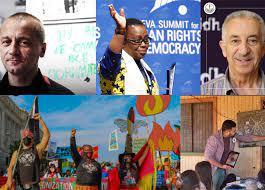
https://www.ohchr.org/en/stories/2023/12/human-rights-75-meet-winners
The Human Rights Prize was created to recognize outstanding individuals and organizations within the field of human rights. It was first awarded by the General Assembly in 1968 and has been celebrated every five years.
The 2023 UN Human Rights Prize will be presented on 15 December at the UN General Assembly Hall, also in commemoration of the 75th anniversary of the Universal Declaration of Human Rights. UN High Commissioner for Human Rights Volker Türk will attend the ceremony, along with UN Secretary-General António Guterres, the President of the General Assembly, Dennis Francis, and other keynote speakers.
The Prize awardees are as follows:
Viasna
Viasna is a human rights organization established by Nobel Peace Prize laureate Ales Bialiatski in 1996 in Belarus. Viasna focuses on offering protection and assistance to victims of political repression. They also conduct human rights education, monitor peaceful assemblies, document abuses and advocate for broader respect for human rights within Belarus. The government of Belarus cracked down on its operations during the crisis in 2020. Several of their leaders were imprisoned and its activities outlawed in the country. Despite this, Viasna continues to advocate for the people of Belarus from the outside, with members spread across several countries. They remain committed to their ethos as an organization while new legislation aims to shrink their already limited space.
Julienne Lusenge
Born into a family that championed the value of freedom of expression, Julienne Lusenge developed a profound empathy for women in her village who lacked the ability to raise their voices. Motivated by this, Lusenge established SOFEPADI (Solidarité Féminine pour la Paix et le Développement Intégral) in 2000 with the goal of advancing women's rights, enhancing their participation in political spheres, and fostering peace in the Democratic Republic of Congo (DRC).
In 2007, Lusenge also founded Fonds pour les Femmes Congolaises (Fund for Congolese Women), marking a groundbreaking initiative as the first non-governmental organization dedicated to mobilizing financial and technical support for grassroots organizations, networks, and women and girls' groups actively engaged in promoting women's rights.
Her unwavering commitment and impactful contributions have been acknowledged on global stages, earning her multiple awards leading up to the latest honour. Humbly attributing the honour to all Congolese women, Lusenge expressed her dedication to their collective cause. She passionately emphasized the need for the younger generation, including our daughters, to join the ongoing fight for justice and collaboration. In her words, "We need them, young sisters to come, our daughters to come with us to fight, and to continue to collaborate, to be together in solidarity so we can go far."
The Amman Center for Human Rights Studies
The Amman Center for Human Rights Studies (ACHRS) is a human rights organization based in Amman, Jordan. They were established in 1999 and have had special consultative status with the Economic and Social Council (ECOSOC) since 2006. Dr. Nizam Assaf, Director of the ACHRS emphasized the organization’s focus on strengthening civil society in the Arab region through education and trainings with a strong focus on human rights and democracy. They also conduct research and publish studies that help to strengthen their other activities. Most of their activities aim to especially support and engage with women and youth but are open to all segments of society.
Julio Pereyra Sánchez
Julio Pereyra Sánchez is a human rights activist, who focuses on the rights of the child, persons with disabilities and Indigenous Peoples. After encountering an out-of-school 6-year old child with disabilities, Sánchez is triggered to advocate for human rights and initiate “Caminos de Tiza” – a therapeutic-pedagogical approach tailored to Indigenous communities, rural colonies, and marginalized neighborhoods.
In the last five years, he travels throughout Latin America educating communities about primary health care as well as sexual and reproductive health rights.
“One never knows the real impact of how many lives can be saved simply by waking up one day and saying, "I want to do this." He stated.
His work was recognized by the Global Teacher Awards (India), the "Espiral" International Educational Award (Spain) and the Ibero-American Award for Teaching Work (Association of Educating for Human Development. It has contributed to the re-institutionalization of more than 700 children, and helped provide access to vaccines, identity documents, and reform public policies.
Global Coalition of civil society organizations, Indigenous Peoples, social movements and local communities for “the universal recognition of the right to a clean, healthy and sustainable environment”
The Coalition includes a diverse group of over 1350 organizations from 75 countries across the world. Their uniting mission is to recognize and uphold the right to a clean, healthy, and sustainable environment. With only four years’ operating since their establishment in 2020, the Coalition has made a huge impact in advocating for the universal right to a clean, healthy and sustainable environment. This right was recognized by the Human Rights Council in 2021 and the General Assembly in 2022, thanks to the Coalition’s hard work.









